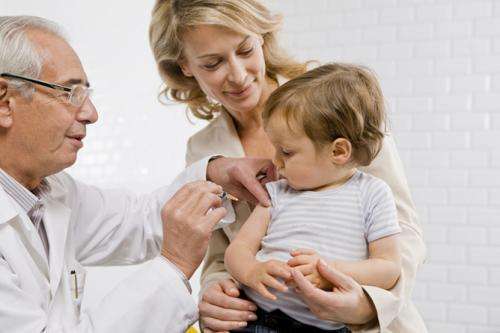Pneumococcal rates plunge after widespread vaccination of infants

The number of young children contracting the most common strains of potentially fatal pneumococcal disease has plummeted 97% since the universal vaccination against this bacterial disease began in 2005, with unvaccinated adults also reaping the benefits of widespread immunisation of infants.
Pneumococcal disease, caused by infection with the bacteria Streptococcus pneumoniae and spread through respiratory droplets, can lead to pneumonia or meningitis, an infection of the membranes around the brain and spinal cord.
It most commonly affects children under the age of two and the elderly, and those who go on to develop meningitis are at risk of permanent brain damage or death.
A new paper, published by Australian Prescriber, said that since a program of universal pneumococcal vaccination for under two-year-olds was introduced in 2005, severe infection (referred to as 'invasive' pneumococcal disease) caused by the seven most common strains of pneumococci had plunged by 97%, from 60.9 per 100,000 to 2.1 per 100,000.
Overall, the rate of infection with any of the pneumococcal disease strains fell by 75% among non-indigenous children under two, from 78 per 100,000 in 2002–04 to 19.5 per 100,000 in 2007, the data showed.
"Substantial reductions in invasive disease were also observed in older children and adults, the age groups who did not receive the vaccine," the paper said.
Co-author of the paper, Dr Clayton Chiu from the National Centre for Immunisation Research and Surveillance of Vaccine Preventable Diseases, said the rapidly falling rates of toddlers contracting the disease had benefits for everyone.
"That's partly because of the herd immunity we get in the community. There's a second benefit of the program," he said.
Risks for Indigenous people
Dr Chiu said that Aboriginal people are at higher risk of developing pneumococcal diseases.
"We are seeing a gap of about three times higher rate of pneumococcal infection in indigenous children," he said.
"Immunisation rates are very good but it's partly because of the nature of the disease and how it's transmitted. There is work being done on trying to reduce that gap."
Non-indigenous people aged 65 and over, as well as indigenous people aged 50 and over, are also advised to get immunised against the disease.
"For younger adults with factors that increase their risk, like being a tobacco smoker or having lung disease, the vaccine is also recommended," he said.
Jabbed
The vaccination documentary Jabbed, screened on SBS last night, recounted the story of five-year-old Abigale Peterson, who died in her mother's arms en-route to hospital after contracting pneumococcal disease. She was immunised against other diseases but not against pneumococcal.
The documentary shed light on the science of vaccinations and those who oppose immunisation, but Dr Chiu said there was no evidence to suggest that there had been a recent decrease in pneumococcal vaccination rates in Australia.
David Isaacs, Professor of Pediatric Infectious Diseases at the University of Sydney, said the pneumococcal vaccine program had been "a great success story."
"Pneumococcal meningitis is a horrible, horrible condition and it's likely to leave your child brain damaged. When I was a medical student, there were no pneumococcal vaccines and we just hated seeing children with pneumococcal meningitis," said Professor Isaacs.
"This is a wonderful example of how vaccines really do work and the side effects are minimal."
This story is published courtesy of The Conversation (under Creative Commons-Attribution/No derivatives).















